Proper hydration becomes critical as you age since your body’s water conservation ability declines after 35. You’ll recover faster from workouts when well-hydrated, while dehydration impairs muscle repair and joint function. Watch for warning signs like dark urine, fatigue, or confusion during exercise. Establish a hydration routine: drink 16-20 ounces before workouts and sip regularly throughout. The right fluid balance doesn’t just prevent stiffness—it’s your secret weapon for fitness longevity.
Hydration: Key to Senior Fitness Recovery Success
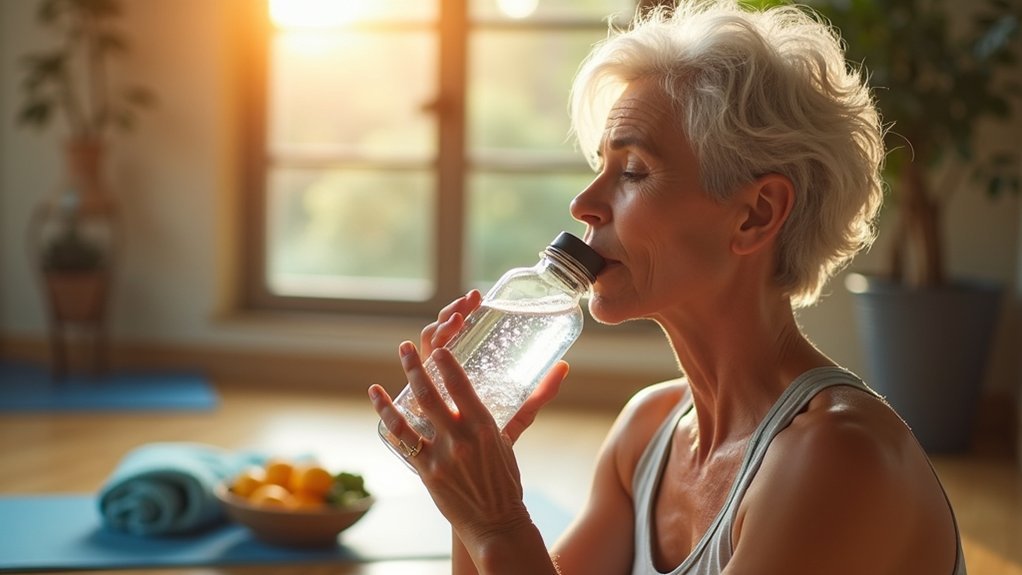
While many seniors focus on exercise routines and strength training, proper hydration remains the unsung hero of effective recovery. As an older adult, your body’s ability to conserve water diminishes with age, making consistent water intake even more vital for your overall health.
Stay hydrated to support digestion, regulate body temperature, and optimize bodily functions—all essential components of post-workout recovery. Watch for signs of dehydration like dry mouth, dark urine, or unusual fatigue, which can greatly impair your fitness progress.
Hydration isn’t optional—it’s the foundation upon which effective senior fitness recovery is built.
Developing personalized hydration strategies can make all the difference. Consider tracking your daily consumption, keeping water easily accessible, or enhancing flavor with natural fruits.
Proper hydration not only improves recovery but also helps manage chronic conditions like diabetes and hypertension common among seniors.
Why Hydration Matters More After Age 35
As your body crosses the age-35 threshold, hydration becomes markedly more critical for fitness recovery. Your aging physiology experiences declining water conservation abilities, making you more susceptible to dehydration. Proper fluid intake directly supports muscle function during the extended recovery periods your body now requires.
- Your muscle mass naturally decreases after 35, making hydration essential for supporting repair processes.
- Dehydration can impair your cognitive function and coordination during workouts.
- Your cells need adequate hydration to efficiently transport nutrients for recovery.
- Proper electrolyte balance prevents muscle cramps and supports muscle contractions.
- Your energy levels suffer notably when dehydrated, compromising both workout quality and recovery.
Don’t underestimate hydration’s role in your fitness journey—it’s no longer just about quenching thirst, but supporting your body’s changing recovery needs.
Signs Your Recovery Is Suffering From Dehydration
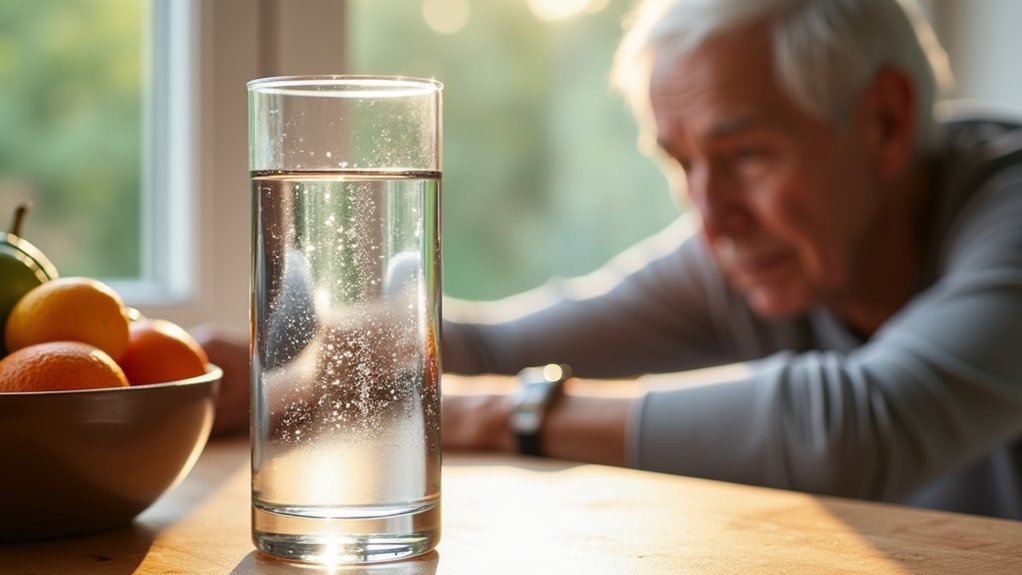
You’ll notice your recovery suffering from dehydration through physical warning signals like dark urine, dry mouth, or visible signs such as sunken eyes and dry skin.
Mental clarity issues, including confusion and increased fatigue, can indicate your body lacks proper hydration to support cognitive function during recovery.
These signs shouldn’t be ignored, as they directly impact your muscle performance and ability to engage effectively in rehabilitative exercises.
Physical Warning Signals
Recognizing the early signs of dehydration can make a critical difference in your fitness recovery as a senior. Your body communicates hydration needs through physical signals that directly impact muscle repair and physical therapy progress.
- Dry mouth or cracked lips often appear first, warning that dehydration may be compromising your recovery.
- Dark yellow urine or reduced urination frequency indicates your hydration levels aren’t supporting ideal healing.
- Unexplained fatigue or confusion can signal dehydration that’s undermining your ability to complete rehabilitation exercises.
- Sunken eyes or dry skin that doesn’t bounce back when pinched require immediate attention.
- Severe symptoms like rapid heartbeat or dizziness demand consultation with your healthcare provider.
Don’t dismiss these warning signs—proper hydration forms the foundation of successful recovery and can dramatically improve your fitness outcomes.
Mental Clarity Issues
When your brain doesn’t receive adequate hydration, your mental sharpness suffers alongside your physical recovery. Dehydration can lead to considerable cognitive decline, making therapy sessions less effective as you struggle to follow instructions or remember exercises.
| Mental Issue | Symptoms | Recovery Impact |
|---|---|---|
| Memory Loss | Forgetting instructions | Slows progress |
| Confusion | Disorientation during sessions | Reduces effectiveness |
| Concentration | Inability to focus on tasks | Decreases exercise quality |
Monitoring your hydration status through simple checks like urine color (dark yellow urine indicates dehydration) and energy levels helps prevent these issues. Proper hydration supports brain function, allowing you to maintain mental clarity during recovery sessions. When fatigue sets in due to dehydration, your ability to bounce back from exercises diminishes considerably, creating a frustrating cycle that impedes your healing journey.
Optimal Hydration Timeline: Before, During, and After Exercise
Proper timing of fluid intake considerably impacts exercise performance and recovery for seniors. Your ideal hydration strategy should follow a specific timeline to support muscle function and post-workout recovery.
Timing your hydration isn’t just helpful—it’s essential for maximizing exercise benefits as you age.
- Drink 16-20 ounces of water 2-3 hours before exercising to prepare your body.
- Sip 7-10 ounces every 10-20 minutes during activity to maintain performance.
- After workouts, replenish fluids based on your weight loss during exercise.
- Include water-rich foods like cucumbers and watermelon to enhance hydration.
- Monitor your hydration status by checking urine color—aim for pale yellow.
This timeline guarantees you’re properly hydrated throughout your fitness journey. By following these guidelines, you’ll support your body’s needs before activity, maintain energy during exercise, and facilitate effective recovery afterward.
Electrolyte Balance: Beyond Just Drinking Water
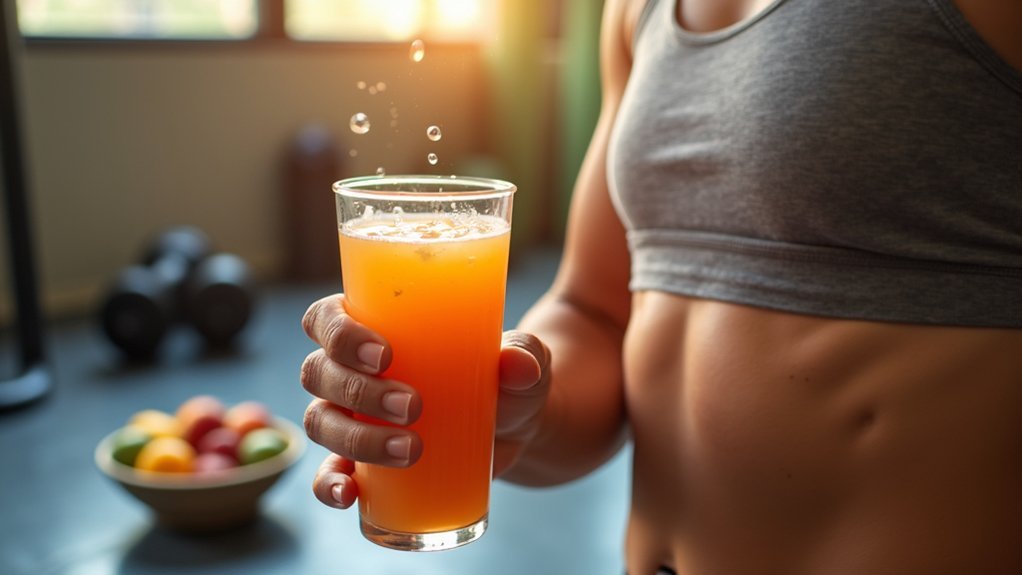
While water forms the foundation of good hydration, your body needs more than just fluids to recover effectively after exercise. Electrolytes—sodium, potassium, and magnesium—play a critical role in your recovery process. Staying hydrated helps maintain these minerals at peak levels, supporting proper muscle contractions and preventing cramps.
For seniors, electrolyte balance becomes especially important as it helps reduce muscle fatigue and cognitive impairments that can follow physical activity. Drinking enough water helps distribute these minerals throughout your body, but you’ll also benefit from consuming electrolyte-rich foods like bananas, spinach, and coconut water.
During hot weather or intense workouts, pay special attention to replenishing these essential minerals. Proper hydration isn’t just about quantity—it’s about maintaining the quality of fluids your body needs to thrive.
Hydration Strategies That Work For Busy Seniors
Understanding the importance of electrolytes is one thing, but creating practical habits that fit into your daily routine is quite another challenge. Hydration is key to helping you recover faster from your fitness activities. To maintain proper hydration, aim to drink at least half your body weight in ounces of water daily.
- Place lightweight water bottles throughout your home for easy access
- Use frequent reminders or tracking apps to monitor your water intake
- Try flavored water with lemon or cucumber to make hydration more appealing
- Consume water-rich foods like watermelon and leafy greens with meals
- Set specific hydration goals tied to daily activities (like drinking water before and after exercise)
These simple strategies can help you stay consistently hydrated without disrupting your busy schedule.
The Connection Between Joint Health and Proper Fluid Intake
Your joints depend heavily on adequate hydration to function smoothly and painlessly during your fitness journey. When you’re properly hydrated, your body maintains ideal levels of synovial fluid—the natural lubricant that reduces friction between your joints as you move.
Consistent fluid intake directly supports cartilage health, potentially decreasing your risk of developing arthritis while enhancing your mobility. If you’re dehydrated, you’ll likely experience increased joint stiffness and discomfort, as your tissues become more sensitive to inflammation.
Water also facilitates essential transportation of nutrients to your joints while removing waste products that could compromise joint integrity.
To protect your joint health, establish a daily hydration routine incorporating both water and water-rich foods—your joints will thank you with improved performance and reduced pain.
How Hydration Enhances Sleep Quality and Recovery
The relationship between hydration and sleep quality becomes increasingly essential as we age, particularly for seniors engaged in regular exercise. Proper fluid intake supports your body’s natural recovery processes during sleep, creating a foundation for better health and fitness outcomes.
- Well-hydrated bodies regulate temperature more effectively, preventing nighttime discomfort that can disrupt your sleep cycles.
- Adequate hydration supports melatonin production, your body’s natural sleep hormone.
- Staying hydrated improves cognitive function during waking hours and enhances brain recovery during sleep.
- Dehydration can cause restlessness and discomfort, interfering with the deep sleep needed for muscle repair.
- Proper fluid intake helps alleviate symptoms of common sleep disorders, promoting more restorative rest.
Don’t underestimate how your hydration habits directly impact your recovery potential through improved sleep quality.
Frequently Asked Questions
What Is the Fastest Way to Hydrate an Elderly Person?
Offer electrolyte-rich fluids in small, frequent sips. You’ll hydrate them faster using a straw if they have mobility issues. Include water-rich foods like watermelon and monitor their urine color for hydration status.
How Does Hydration Help Recovery After Exercise?
Hydration helps your recovery by enhancing muscle elasticity, transporting nutrients to repair tissues, regulating body temperature, and improving cognitive function. You’ll experience less soreness and faster healing when you’re properly hydrated after exercise.
How Much Fluid Should a 70 Year Old Drink a Day?
You should aim for about 2.7 liters (91 ounces) daily at age 70. That’s roughly half your body weight in ounces. Don’t wait until you’re thirsty—drink regularly and check your urine color.
What Is the Best Hydration for Recovery?
You’ll recover best by drinking water and electrolyte beverages after exercise. Aim for half your body weight in ounces daily. Monitor your urine color—pale yellow means you’re properly hydrated for ideal muscle function.
In Summary
You can’t afford to overlook hydration in your fitness journey after 35. It’s not just about quenching thirst—it’s about recovery, joint health, and quality sleep. Watch for dehydration signs, balance your electrolytes, and develop a consistent hydration routine that fits your lifestyle. When you prioritize proper fluid intake, you’ll notice improved performance and faster recovery times. Your body will thank you.

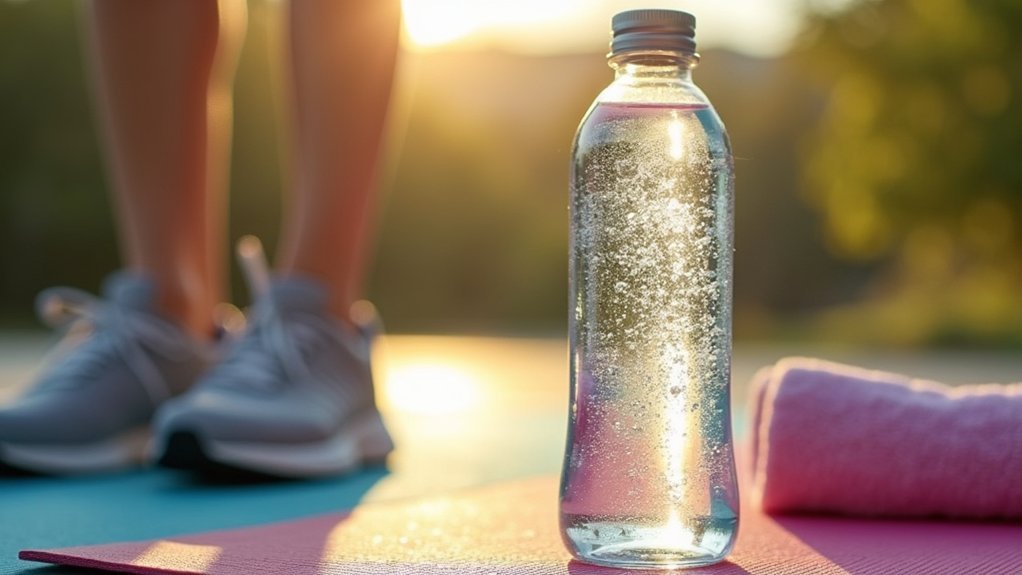
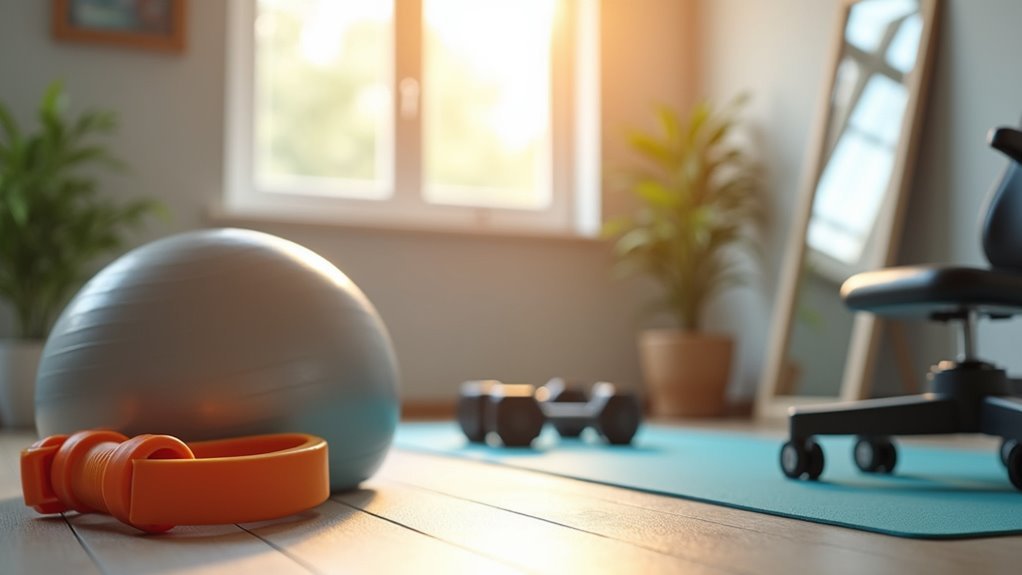
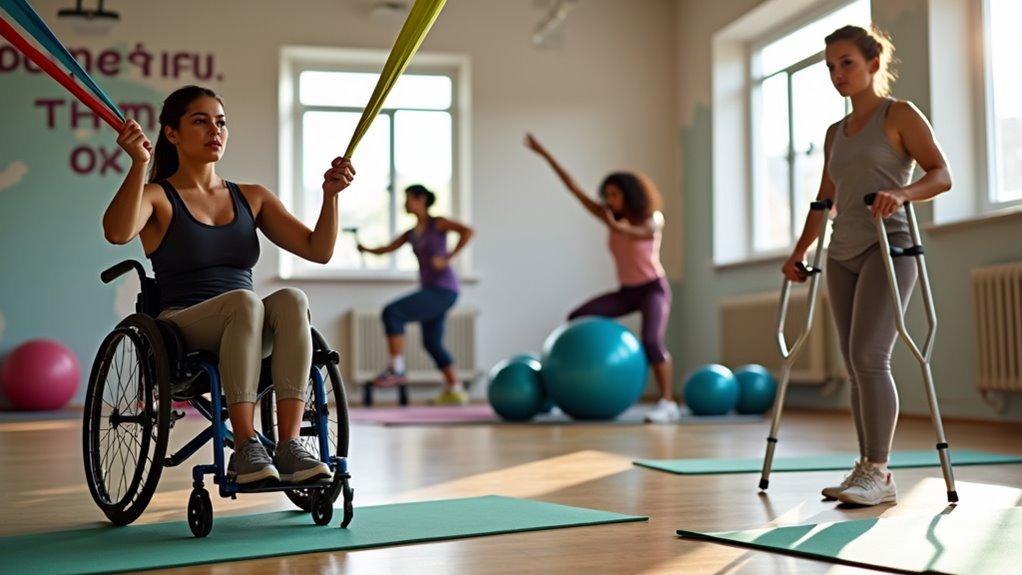
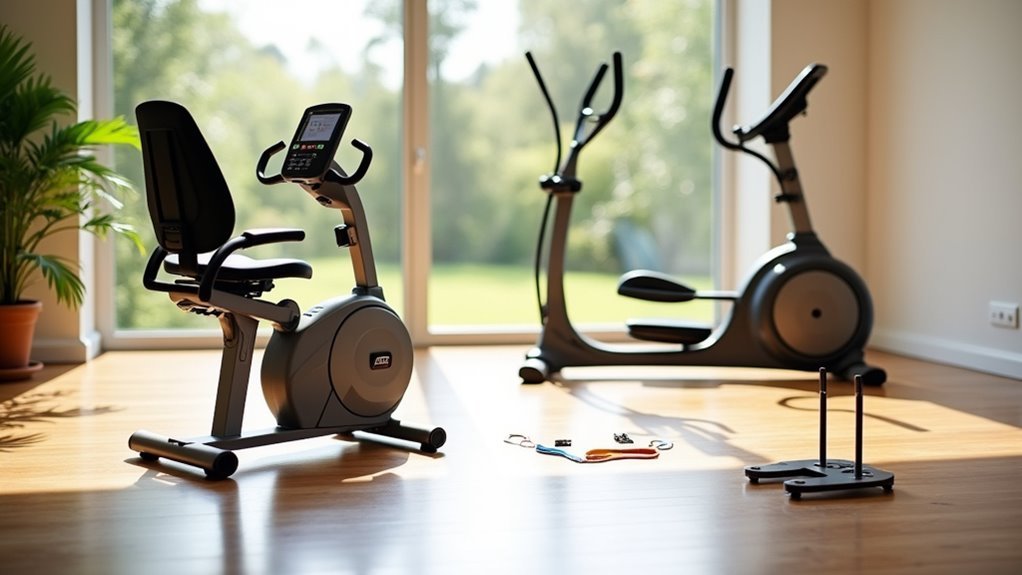
Leave a Reply